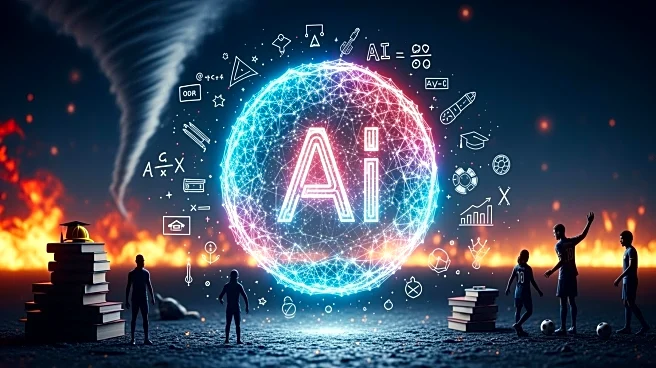What's Happening?
A recent paper from OpenAI highlights a fundamental issue with AI chatbots: their tendency to avoid expressing uncertainty, leading to frequent misinformation. AI models are designed to provide confident
answers, even when incorrect, which can mislead users who equate certainty with accuracy. This characteristic of AI poses challenges for educational settings, where grappling with complexity and uncertainty is essential for learning. The paper suggests that educators should carefully consider how AI tools are integrated into classrooms, ensuring they align with educational goals that emphasize critical thinking and evidence-based reasoning.
Why It's Important?
The integration of AI in education has the potential to transform learning experiences, but it also presents risks if not managed properly. AI's avoidance of uncertainty can undermine efforts to teach students critical thinking and the importance of questioning information sources. Educators must be cautious in using AI tools, ensuring they complement rather than replace traditional learning methods that encourage exploration and skepticism. The findings from OpenAI's research highlight the need for digital literacy education that equips students to critically evaluate AI-generated information and understand its limitations.
What's Next?
Educators and policymakers may need to develop guidelines for the responsible use of AI in educational settings. This could involve training students to recognize and question AI-generated content, as well as teaching them how to prompt AI for more reliable information. Schools might also explore partnerships with AI developers to create educational tools that prioritize transparency and accuracy. As AI technology continues to evolve, ongoing research and dialogue will be necessary to ensure its integration into education supports rather than hinders student learning.
Beyond the Headlines
The issue of AI's avoidance of uncertainty raises broader ethical questions about the development and deployment of AI technologies. It highlights the importance of designing AI systems that align with human values and educational goals. The challenge of integrating AI into education also reflects wider societal debates about the role of technology in shaping knowledge and information access. As AI becomes more prevalent, there may be increased scrutiny of its impact on learning and the need for policies that ensure its responsible use in educational contexts.











